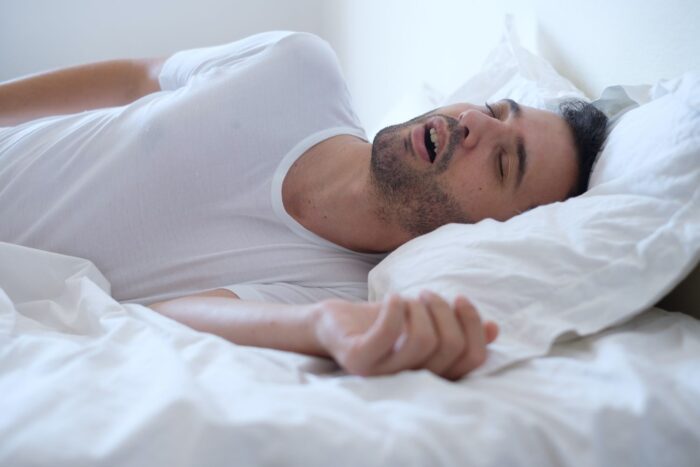Snoring is a common sleep-related issue that many people experience at some point in their lives. While snoring can disrupt sleep, it does not always indicate the presence of a more serious condition. However, you should consider talking to your doctor if you think you may have sleep apnea.

What Causes Snoring?
Snoring occurs when the flow of air through the mouth and nose is partially obstructed during sleep. As the air passes through the narrowed airway, it causes the surrounding tissues to vibrate. This results in the characteristic sound of snoring. Several factors can contribute to snoring.
During sleep, the muscles in the throat and tongue naturally relax, narrowing the airway. If you have allergies or sinus problems, it can make it difficult for air to pass freely through the nose. You may notice this issue if you have a cold or during allergy season.
Another issue that can cause snoring is obesity. Excess weight and fat deposits around the neck can put pressure on the airway. This can increase the likelihood of snoring. Additionally, consuming alcohol or certain sedatives relaxes the muscles, making snoring more likely.
Sleep Apnea: A Sleep Disorder
Sleep apnea is a sleep disorder that creates pauses in breathing during sleep. These pauses can last for several seconds and occur multiple times throughout the night. There are three main types of sleep apnea:
- Obstructive Sleep Apnea (OSA): The most common type, OSA, occurs when the airway becomes completely or partially blocked during sleep.
- Central Sleep Apnea (CSA): CSA is caused by a failure of the brain to send proper signals to the muscles that control breathing.
- Complex Sleep Apnea Syndrome (Mixed): Mixed sleep apnea combines obstructive and central sleep apnea.
Does Snoring Mean Sleep Apnea?
While snoring is a symptom of sleep apnea, not everyone who snores has sleep apnea. Snoring can be a normal occurrence in some people. Sometimes, it doesn’t mean you will have any health risks. However, it is essential to be aware of certain signs and symptoms of sleep apnea.
People with sleep apnea often feel excessively tired during the day, regardless of the amount of sleep they get at night. They may also wake up with headaches. This is due to disrupted sleep patterns and a lack of oxygen.
Additionally, partners or family members may observe episodes of breathing cessation during sleep. They may note abrupt awakenings with gasping or choking sounds.
Treatment Options for Sleep Apnea
To treat sleep apnea, there are several options available. You will need to consult your provider to see which is right for you.
One of the most common options for sleep apnea is a continuous positive airway pressure (CPAP) machine. CPAP therapy involves wearing a mask over the nose or mouth during sleep. This device delivers a constant flow of air to keep the airway open.
For those with mild to moderate sleep apnea, you can try oral appliances. These devices help reposition the jaw or tongue to keep the airway open during sleep.
